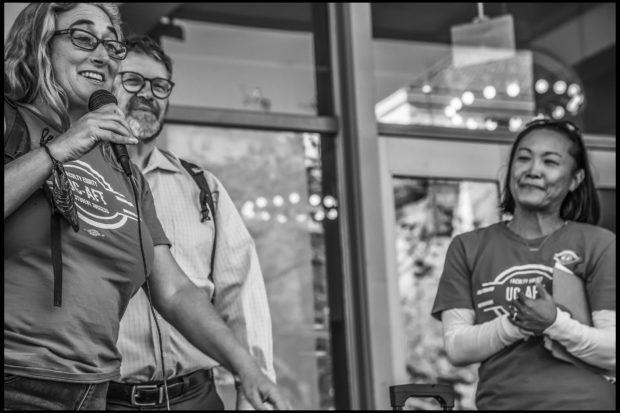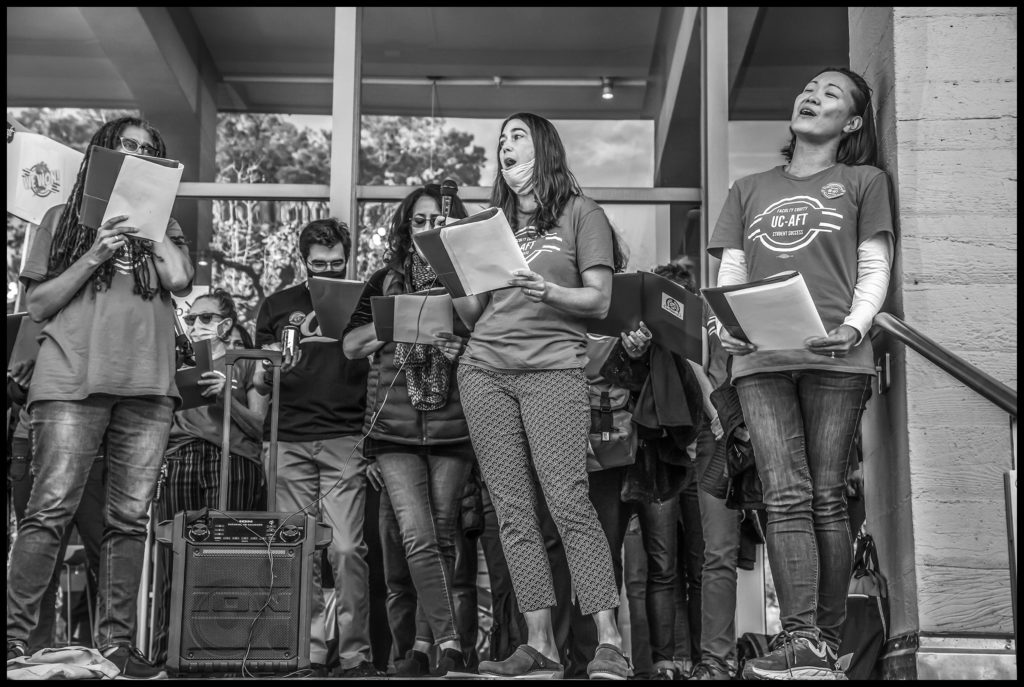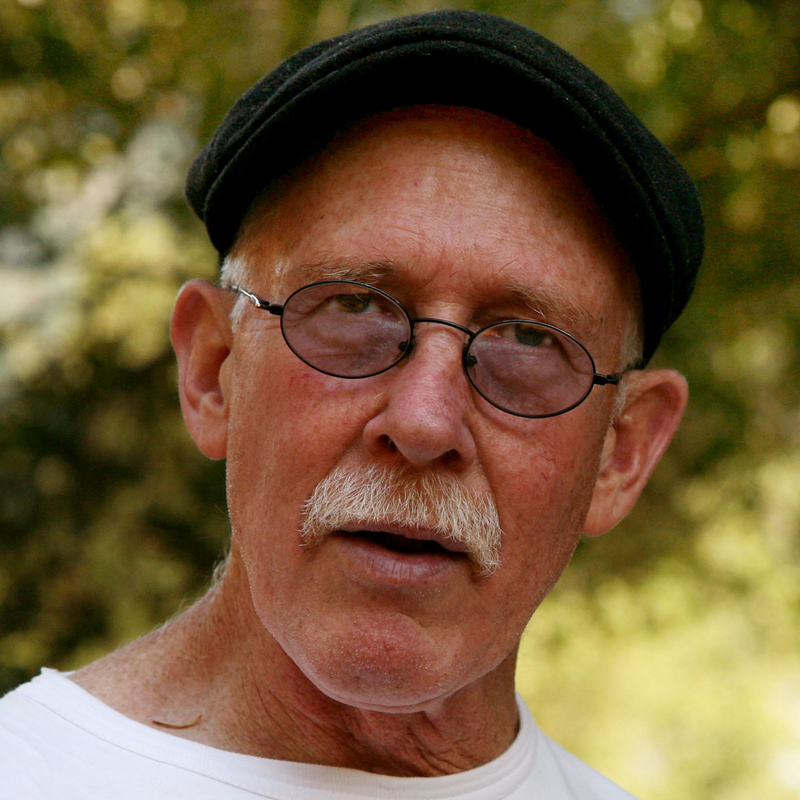
By Jane Hundertmark and David Bacon

UC lecturers were ready on Nov. 18 to set up morning picket lines at the entrances to all nine UC campuses. At Berkeley, the strike lines normally go up first between Bancroft Way and the famous Sather Gate. But instead of going on strike, no angry lines appeared. And at noon, lecturers massed in front of the MLK Student Union in what was an almost festive atmosphere.
Cheers broke out as members of the lecturers’ bargaining team announced that an agreement had been reached with university administrators the night before.
“Whose University? Our University!”—the chant familiar in every lecturers’ rally—became a victory cry. It echoed across the plaza against the windows of Sproul Hall, from which students were dragged 60 years ago at the beginning of the modern era of university activism. It would have seemed familiar to them—a sign that lecturers and their students had taken another step, a generation later, toward the same goal.
One lecturer, Khalid Kadir, called “beloved” by rally chair Crystal Chang-Cohen, told the crowd, “We need to continue to assert this is our university.”
Kadir explained the obvious reason why administrators had agreed the night before: “They didn’t stay up until 5 a.m. because they wanted to. They stayed up until 5 a.m. for a reason—they were terrified that the moment we stop working the university stops working. We make the university function. It only works because we do.”
The biggest cheers at the rally greeted the announcement that the union had broken through on what has been one of the most important issues for the last 50 years—the precarious nature of lecturer jobs. The agreement summary posted by the union on Nov. 18 says that it “revolutionizes the first six years of a lecturer’s career at the UC.”
Lecturers now will get a formal review after their first year and a preference for classes the next year before any new hire. After two more years, another review and a continuing appointment. And finally, a third three-year appointment leads to another review and a permanent appointment.
“Unlike the current system of complete precarity through the first five years of a lecturer’s career with a requirement that lecturers apply for their jobs each year, after the first year all the contracts are multiyear.”
The new agreement also contains wage raises that Ben Brown, a bargaining team member, told the Berkeley crowd amounted to “an average salary increase between 30% and 38%.”
Winning a livable salary was one of the key factors that motivated students on the Berkeley campus to support their teachers. A letter from the Political Economy Students Association (PESA) and the Associated Students outlined “a sample of some of our most beloved lecturers’ 2020 salaries.”
After listing a few salaries, the letter charged that “most of them will STILL either be under or just above the low-income threshold of Alameda County. This is unacceptable.”
In the event of a strike, it warned, “We will be standing right beside our lecturers and bringing senate faculty with us…The world is watching.”
Caroline Quigley, co-chair for communications of the PESA and the letter’s author, was introduced to the rally by her proud teacher, Chang-Cohen. Quigley described the note she wrote to the university’s lead negotiator, Associate Director of Labor Relations Nadine Fishel, expressing her shock at learning that Fishel herself was a UC Berkeley political economy alumna.
Most lecturers present felt that the letter, and other support from students, faculty and other university workers, played a key role in winning the new contract. Brown also credited the sessions of open negotiations held over Zoom, which let rank-and-file lecturers hear what was happening at the bargaining table.
“The pandemic was awful in so many ways,” Brown said, “but it was great for bargaining—to negotiate in front of 300 colleagues.”
The crowd responded by chanting, “When we fight, we win!”
Tiffany Page, a bargaining team member from the Berkeley campus, told the rally that the union’s persistence in the face of university stalling for more than two years finally paid off.
“We had 55 bargaining sessions,” Page said. And in the end, “the team stayed up for the last 48 hours to get an agreement. I think there are some really great improvements in this contract.”
Strike team members also spoke out.
“Unions work. Collective action works,” said one member. Another called it “a game-changing contract.”
Anna Lee recalled that she had belonged to the graduate students’ union at Berkeley before getting a job as a lecturer. “This contract is huge,” she said.
“I may not have to work at the two other campuses I work at now. People have said to me, ‘why don’t you quit being a lecturer and get a real job?’ As one of the 40% of teaching faculty here at UC Berkeley, I want to say thank you.”
David Walter, a long time lecturer activist, told the gathering, “I’ve been a lecturer here several years but am still pre-six,” he said.
“Lecturers have to get another job to pay the rent, but that is no longer the case here at UC Berkeley. One job is enough. We’re not alone anymore. We don’t have to sink into our offices. We are now family.”
The rally ended on a note of caution from Kadir, who said that despite the gains, lecturers still don’t make a salary that allows them to live in dignity in the Bay Area. Nor do the other workers on the campus. The problem, however, is not that the university doesn’t have money.
“We do not have a budget problem,” Kadir explained. “We have a distribution problem—there are people on this campus who are paid too much, while most of us are paid too little.”
The new contract has changed some of that for lecturers, but graduate students, researchers and other campus workers are still struggling to survive. “This means we have a 5-year contract, and now we can come to other people’s rallies,” he warned. “This is only the beginning.”
*****
Jane Hundertmark is the CFT (A Union of Educators and Classified Professionals) publications director. David Bacon is a California journalist and photographer and a former union organizer. His latest book is In the Fields of the North/En los campos del Norte (University of California/Colegio de la Frontera Norte, 2017).

